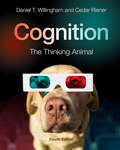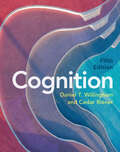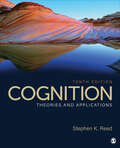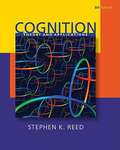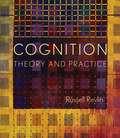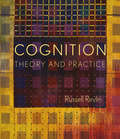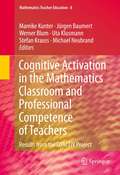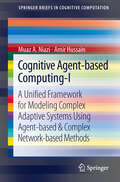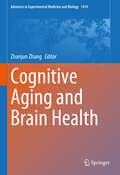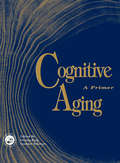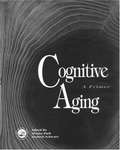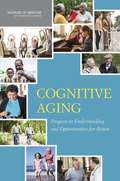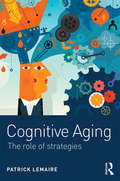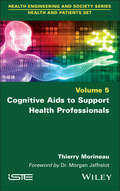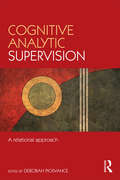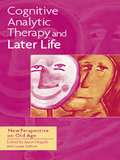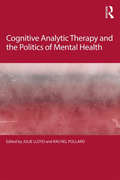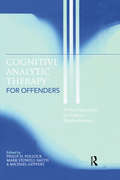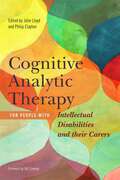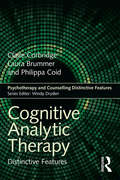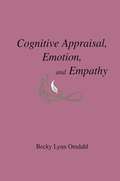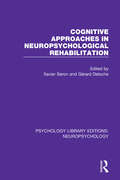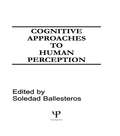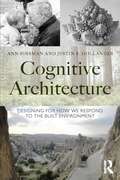- Table View
- List View
Cognition: The Thinking Animal
by Daniel T. Willingham Cedar RienerBy describing experiments that control, manipulate and measure mental processes, this book shows how we can discover the answers to key questions about the mind, such as: 'Can we focus attention on more than one thing?' and 'Is language unique to humans?' Written in a down-to-earth narrative prose that avoids jargon, addresses the reader directly and draws on the authors' unique style ('suppose Willingham split his pants at a junior high dance …'), this text takes complex experiments in cognitive psychology and describes them for undergraduate students. Willingham has a record of excellence in translating cognitive psychology research for K-12 teachers with his bestselling Why Don't Students Like School? and other popular books. This book applies the clear and approachable prose style towards building foundational knowledge in cognitive psychology for undergraduates.
Cognition: The Thinking Animal
by Daniel T. Willingham Cedar RienerFully revised and updated for the fifth edition, Cognition offers an approachable yet deep introduction to the science of the mind. Avoiding the pitfall of a grab bag of phenomena, Willingham and Riener survey key mental processes such as memory, language, and problem-solving and connect them to experimental process. This new edition has been fully revised and updated with new references, figures, and experiments, with particular attention to the intersection of cognition and culture. Written in a down-to-earth narrative prose that avoids jargon, addresses the reader directly, and cracks a few jokes, Cognition offers an accessible introduction that is ideal for students of all levels.
Cognition: Theories and Applications
by Stephen K. ReedNow published by SAGE! A classic text for the undergraduate Cognitive Psychology course, Cognition: Theories and Applications provides an overview of the origins of this experimental field and makes connections with our current understanding of cognitive processes through deep dives into classic and current research findings. Author Stephen K. Reed offers streamlined coverage of classic and contemporary theories, an emphasis on real world applications, and an easy-to-follow explanatory style that demonstrates how cognitive processes are connected. This fully-revised Tenth Edition includes a new, standalone chapter dedicated to Action; full-color visuals; and new research findings in the areas of cognitive neuroscience, linguistics, and robotics. This title is accompanied by a complete teaching and learning package.
Cognition: Theories and Applications
by Stephen K. ReedNow published by SAGE! A classic text for the undergraduate Cognitive Psychology course, Cognition: Theories and Applications provides an overview of the origins of this experimental field and makes connections with our current understanding of cognitive processes through deep dives into classic and current research findings. Author Stephen K. Reed offers streamlined coverage of classic and contemporary theories, an emphasis on real world applications, and an easy-to-follow explanatory style that demonstrates how cognitive processes are connected. This fully-revised Tenth Edition includes a new, standalone chapter dedicated to Action; full-color visuals; and new research findings in the areas of cognitive neuroscience, linguistics, and robotics. This title is accompanied by a complete teaching and learning package.
Cognition: Theory and Applications (8th edition)
by Stephen K. ReedAimed at college undergraduates, this text offers a clear and comprehensive overview of the rapidly evolving field of cognition. Reed (psychology, San Diego State U. ) shows the direct relevance of cognitive psychology to daily activities and the impact of cognitive theories on other fields of psychology. This seventh edition includes new material on current topics such as experience-based versus theory- based judgments of retention, Barsalou's perceptual symbols theory, Kintsch's construction-integration model of text comprehension, and decision frames for risk dimensions. The text has a companion online lab and study guide.
Cognition: Theory and Practice
by Russell RevlinThe author wrote this book with his students in mind so as to address their questions and to challenge them to grasp the methodologies, findings, and applications of basic research.
Cognition: Theory and Practice
by Russell RevlinDemonstrating the link between theory, experimental findings, and ordinary, human activity, Cognition: Theory and Practice shows you how the field of cognitive psychology relates to everyday life.
Cognitive Activation in the Mathematics Classroom and Professional Competence of Teachers: Results from the COACTIV Project (Mathematics Teacher Education #8)
by Jürgen Baumert Mareike Kunter Werner Blum Stefan Krauss Ute Klusmann Michael NeubrandThis work reports the findings of the Professional Competence of Teachers, Cognitively Activating Instruction, and Development of Students´ Mathematical Literacy project (COACTIV). COACTIV applies a broad, innovative conceptualization of teacher competence to examine how mathematics teachers' knowledge, beliefs, motivational orientations, and self-regulation skills influence their instructional practice and teaching outcomes In this project data was collected on various aspects of teacher competence and classroom instruction from the perspective of both the teachers themselves and their students. Moreover, it gauges the effects of these teacher characteristics on student learning, as indexed by the progress students in each class. Questions addressed in the study which are reported in this volume include: What are the characteristics of successful teaching? What distinguishes teachers who succeed in their profession? How can the quality of instruction be improved?
Cognitive Agent-based Computing-I: A Unified Framework for Modeling Complex Adaptive Systems using Agent-based & Complex Network-based Methods (SpringerBriefs in Cognitive Computation #1)
by Amir Hussain Muaz A NiaziComplex Systems are made up of numerous interacting sub-components. Non-linear interactions of these components or agents give rise to emergent behavior observable at the global scale. Agent-based modeling and simulation is a proven paradigm which has previously been used for effective computational modeling of complex systems in various domains. Because of its popular use across different scientific domains, research in agent-based modeling has primarily been vertical in nature. The goal of this manuscript is to provide a single hands-on guide to developing cognitive agent-based models for the exploration of emergence across various types of complex systems. We present practical ideas and examples for researchers and practitioners for the building of agent-based models using a horizontal approach - applications are demonstrated in a number of exciting domains as diverse as wireless sensors networks, peer-to-peer networks, complex social systems, research networks, epidemiological HIV
Cognitive Aging and Brain Health (Advances in Experimental Medicine and Biology #1419)
by Zhanjun ZhangThis book reviews the research trends of cognitive aging and brain health from full-scale. It not only contains cognitive aging’s neurophysiological mechanism, clinical research and intervention measures, but also covers cognitive aging’s social psychological mechanism, such as the relation between old people’s motion, socioeconomic status and the cognitive aging. Through decades of research and practice, the views towards the cognitive aging process havebeen transferred from coping with cognitive decline to promoting cognitive ability. This book provides with the latest research findings and in-depth opinions of the cognitive aging and brain health, assisting researchers to grasp the theories, practice and trends of this field, and guide health-care workers to carry out the treatment and nursing for the aged.
Cognitive Aging: A Primer
by Norbert Schwarz Denise C. ParkAs our society ages, the topic of cognitive aging is becoming increasingly important. This volume provides an accessible overview of how the cognitive system changes as a function of normal aging.Building on the successful first edition, this volume provide an even more comprehensive coverage of the major issues affecting memory, attention, language, speech and other aspects of cognitive functioning. The essential chapters from the first edition have been thoroughly revised and updated and new chapters have been introduced which draw in neuroscience studies and more applied topics. In addition, contributors were encouraged to ensure their chapters are accessible to students studying the topic for the first time. This therefore makes the volume appealing as a textbook on senior undergraduate and graduate courses.
Cognitive Aging: A Primer
by Denise Park Nobert SchwarzAs our society ages, the topic of cognitive aging is becoming increasingly important. This volume provides an accessible overview of how the cognitive system changes as a function of normal aging. Building on the successful first edition, this volume provide an even more comprehensive coverage of the major issues affecting memory, attention, language, speech and other aspects of cognitive functioning. The essential chapters from the first edition have been thoroughly revised and updated and new chapters have been introduced which draw in neuroscience studies and more applied topics. In addition, contributors were encouraged to ensure their chapters are accessible to students studying the topic for the first time. This therefore makes the volume appealing as a textbook on senior undergraduate and graduate courses.
Cognitive Aging: Progress in Understanding and Opportunities for Action
by Dan G. BlazerFor most Americans, staying "mentally sharp" as they age is a very high priority. Declines in memory and decision-making abilities may trigger fears of Alzheimer's disease or other neurodegenerative diseases. However, cognitive aging is a natural process that can have both positive and negative effects on cognitive function in older adults - effects that vary widely among individuals. At this point in time, when the older population is rapidly growing in the United States and across the globe, it is important to examine what is known about cognitive aging and to identify and promote actions that individuals, organizations, communities, and society can take to help older adults maintain and improve their cognitive health. "Cognitive Aging" assesses the public health dimensions of cognitive aging with an emphasis on definitions and terminology, epidemiology and surveillance, prevention and intervention, education of health professionals, and public awareness and education. This report makes specific recommendations for individuals to reduce the risks of cognitive decline with aging. Aging is inevitable, but there are actions that can be taken by individuals, families, communities, and society that may help to prevent or ameliorate the impact of aging on the brain, understand more about its impact, and help older adults live more fully and independent lives. Cognitive aging is not just an individual or a family or a health care system challenge. It is an issue that affects the fabric of society and requires actions by many and varied stakeholders. "Cognitive Aging" offers clear steps that individuals, families, communities, health care providers and systems, financial organizations, community groups, public health agencies, and others can take to promote cognitive health and to help older adults live fuller and more independent lives. Ultimately, this report calls for a societal commitment to cognitive aging as a public health issue that requires prompt action across many sectors.
Cognitive Aging: The Role of Strategies
by Patrick LemaireCognitive Aging and the Role of Strategy is the English Language edition of ‘Vieillissement cognitif et variations stratégiques’, oriiginally published in French . Lemaire is a well-respected professor and text-book author of Cognitive Psychology in France and his English language edition will have updated content on theories of cognitive aging to provide a broad view of adult development and the aging process. This title will be of interest to students of specialist psychology courses at both undergraduate and postgraduate level.
Cognitive Aids to Support Health Professionals
by Thierry MorineauProviding healthcare professionals with cognitive aids, whether a simple checklist or an information system, improves patient care and reduces information-processing constraints for caregivers. However, to achieve these objectives, these aids must be adaptable and ergonomic. Cognitive Aids to Support Healthcare Professionals offers an unprecedented presentation of the different forms of cognitive aids, as well as an analysis of these aids as gateways for channelling resources to support mental activity and a general framework to simply model cognitive aids as Turing machines. Throughout this book, healthcare professionals, executives, hospital managers, healthcare engineers, ergonomists and trainers will find ergonomic advice on the choice or design of cognitive aids, and also, more generally, on the roles that cognitive aids play in activities.
Cognitive Analytic Supervision: A relational approach
by Deborah PickvanceCognitive Analytic Supervision: A relational approach is the first book to present a cognitive analytic perspective on psychotherapy supervision. This edited collection of original chapters reflects the ways in which CAT therapists and supervisors have developed the model and used it in diverse settings. It is a significant contribution to the literature on relational psychotherapy supervision, written by established CAT supervisors, trainers and therapists who, together, have an enormous amount of professional and clinical experience. The book covers important areas such as: the relational theory and practice of CAT supervision a cognitive analytic conceptualization of narcissistic difficulties intercultural issues in supervision (based on CAT training experience in India) ethical and clinical dilemmas in supervision supervision of consultancy work Cognitive Analytic Supervision will be of interest to CAT supervisors, therapists and trainee supervisors, as well as supervisors and therapists working in other therapeutic models, in particular those with a relational approach. This book may be a useful bridge into relationally informed supervision for therapists who do not have an explicitly relational focus.
Cognitive Analytic Therapy and Later Life: New Perspective on Old Age
by Laura Sutton Jason HeppleCognitive Analytic Therapy and Later Life highlights that any attempt to work psychotherapeutically with older people must take into account the effects of working within a context of institutional ageism. It explores the specialist skills required when working with older people, covering:* the delayed effects of early trauma* narcissism and the re-emergence of borderline traits and dissociative states* the emergence of treatment resistant depression and anxiety* the use of the cognitive analytic therapy model to challenge the child centred paradigm of psychoanalytic theory.Clinical psychologists, psychiatrists, psychotherapists, nurses, social workers, and occupational therapists alike will find this an illuminating and thought provoking book.
Cognitive Analytic Therapy and the Politics of Mental Health
by Julie Lloyd Rachel PollardCognitive Analytic Therapy and the Politics of Mental Health provides an overview of the development of cognitive analytic therapy (CAT), and illuminates how the political context affects the way in which therapists consider their work and facilitates their practice. This book examines how CAT contributes to wider debates over ‘the politics of mental health’. With contributions from those working in services – including adult mental health, learning disabilities and child and adolescent therapists – the writers consider how contemporary politics devolves responsibility for mental illness onto those suffering distress. The evolving political and social attitudes clients bring to therapy are also addressed in several chapters, and there is a focus on groups in society who have been marginalized and neglected in mental and physical health services. Cognitive Analytic Therapy and the Politics of Mental Health offers a fresh understanding of the contemporary politics of mental health that will be of interest to all therapists and mental health professionals.
Cognitive Analytic Therapy for Offenders: A New Approach to Forensic Psychotherapy
by Michael Göpfert Philip H. Pollock Mark Stowell-SmithCognitive analytic therapy (CAT) is an established form of integrated psychotherapy, which has been applied in a variety of clinical settings to a diversity of disorders with promising outcomes. In Cognitive Analytic Therapy for Offenders, the authors describe the application of CAT to forensic settings, illustrating the use of this type of therapy with a range of offence types and clinical disorders. CAT is presented as a new form of forensic psychotherapy which can enhance the understanding, conceptualisation, treatment and management of offenders. The book offers a novel description of clinical practice and describes the innovative application of cognitive analytic therapy to forensic work in a variety of contexts and settings for numerous offence types and clinical disorders, including: CAT in the treatment of child sex offenders in secure forensic settings the use of CAT with women in secure settings CAT for parents within prisons CAT for borderline and psychopathic personality disorder CAT for a stalking offender community-based CAT with perpetrators of domestic violence CAT for homicide perpetrators (rage-type, serial sexual, dissociative homicides) the application of CAT for Court reporting and managing boundary violations. This book provides an account of a fresh, new approach to conceptualisation and treatment in forensic psychotherapy, and offers the first description of CAT presented in the form of a compilation of illustrations of practice. It will be essential reading for clinical psychologists and psychiatrists, occupational therapists, and anyone who works within services for offenders.
Cognitive Analytic Therapy for People with Intellectual Disabilities and their Carers
by Steve Potter Michelle Anwyl Val Crowley Perry Morrison Phil Clayton Hilary Brown Nicola Murphy Julie Lloyd Pamela Mount Jo Varela David Wilberforce Simon Crowther Zoe Ball Helen ElfordWith a variety of case examples and contributions from experienced clinicians, this book introduces Cognitive Analytic Therapy (CAT) in practical, user-friendly language, and for the first time guides readers on how to use it to with people with intellectual disabilities. CAT is increasingly recognised as an effective approach for working with people with intellectual disabilities. It focuses on observing and describing typical patterns of how the client relates to others, how they behave in relationships and how they see themselves. By considering how these patterns first developed and how they can be revised in a more constructive direction, CAT can encourage change to occur as the result of healthier relationships. The contributors describe in straightforward terms how CAT may be used with people with intellectual disabilities, and provide CAT tools adapted specifically for this client group. CAT and autism, CAT with people with intellectual disabilities in forensic settings and CAT with survivors of domestic abuse who have intellectual disabilities are also explored in detail. This is essential reading for any clinician wishing to use CAT with people with intellectual disabilities, including psychiatrists, psychologists, psychotherapists, social workers and support workers, as well as professionals across forensic services.
Cognitive Analytic Therapy: Distinctive Features (Psychotherapy and Counselling Distinctive Features)
by Claire Corbridge Laura Brummer Philippa CoidCognitive Analytic Therapy: Distinctive Features offers an introduction to what is distinctive about this increasingly popular method. Written by three Cognitive Analytic Therapists, with many years’ experience, it provides an accessible, bitesize overview of this increasingly used psychological therapy. Using the popular Distinctive Features format, this book describes 15 theoretical features and 15 practical techniques of Cognitive Analytic Therapy. Cognitive Analytic Therapy will be a valuable source for students, professionals in training and practising therapists, as well as other psychotherapists, counsellors and mental health professionals wishing to learn more about the distinctive features of this important therapy.
Cognitive Appraisal, Emotion, and Empathy
by Becky Lynn OmdahlIn a wide array of social sciences, interest in emotion is flourishing. Psychologists, sociologists, anthropologists, communication scholars, and cognitive scientists are exploring human emotions in a variety of contexts. This book speaks to central issues raised by scholars in these disciplines through its review of leading cognitive appraisal theories of emotion, clarification of the nature of empathy, and exploration of how people identify and respond to the emotions hidden within the stories people tell. Intrigue with the separateness and oneness of human existence and experience is evident throughout history. It appears in the teachings of all great religions, in the commentaries of philosophers, and in the perceptions of the most famous characters in classic literature. Perhaps it is this wonderment with human distinction and unity that has spawned interest in empathy as a pervasive human phenomena. This book presents an initial examination of the role of cognitive appraisals in facilitating decoding accuracy and empathy. It compares the leading cognitive appraisal theories and addresses the relationships among appraisal information, empathy, and emotion decoding. Real-life descriptions of emotional experiences are used as the basis for a study examining the relationships between perceived appraisals and perspective-taking, and accurate decoding and empathy. Other studies probe the effects of specific appraisal information on decoding and emotional reactions, and address emotional reactivity to stories and delayed retention. Finally, specific applications are offered for parents, educators, social service employees, writers, advertisers, and people striving for personal well-being and healthy relationships.
Cognitive Approaches in Neuropsychological Rehabilitation (Psychology Library Editions: Neuropsychology #11)
by Xavier Seron Gérard DelocheOriginally published in 1989, presenting a new perspective on cognitive therapy in neuropsychology, these papers examine a cognitively-oriented, single-case methodology in neuropsychological rehabilitation. The recommended strategy is in-depth analysis of the precise nature of the impaired as well as the preserved processing components in the individual patient. The objective is to design a therapeutic course based on individual patient needs that is justified by the theoretical interpretation of the location of the deficit in his or her cognitive architecture.
Cognitive Approaches to Human Perception
by Soledad BallesterosExamining the current state of the research in perception stressing contributions in visual information processing, this volume provides an original and timely account of recent results obtained in this and other related areas of cognitive psychology. The scope of the book is intended to be broad, featuring state-of-the-art contributions from a number of outstanding researchers from different parts of the world -- the United States, Europe, and Australia. The intention is to update areas of considerable theoretical implications and active experimental investigation in this broad field called the "psychology of perception." This volume's main purpose is to highlight, from a cognitive position, a selected number of important theoretical and empirical topics which deal with critical issues in perception and other high level, related cognitive processes such as attention, mental representation, memory, word naming and semantic categorization. The studies reported were designed to answer many far-reaching questions including: * Is the global precedence effect due to low or high level processing? * Can veridical and illusory perception be explained by the same theory? * What is the relationship between attention and perception? * Is perception "direct" or an inferential process? * What mechanisms are involved in picture and word naming and categorization? * How can word and picture processing be modeled? The answers to these questions seek to unite theoretical perspectives on very important areas of cognitive psychology such as attention, perception, representation of visual objects and words, and human memory.
Cognitive Architecture: Designing for How We Respond to the Built Environment
by Ann Sussman Justin B Hollander*Winner of the Environmental Design Research Association 2016 Place Research Award!* In Cognitive Architecture, the authors review new findings in psychology and neuroscience to help architects and planners better understand their clients as the sophisticated mammals they are, arriving in the world with built-in responses to the environment that have evolved over millennia. The book outlines four main principles---Edges Matter, the fact people are a thigmotactic or a 'wall-hugging' species; Patterns Matter, how we are visually-oriented; Shapes Carry Weight, how our preference for bilateral symmetrical forms is biological; and finally, Storytelling is Key, how our narrative proclivities, unique to our species, play a role in successful place-making. The book takes an inside-out approach to design, arguing that the more we understand human behavior, the better we can design for it. The text suggests new ways to analyze current designs before they are built, allowing the designer to anticipate a user's future experience. More than one hundred photographs and drawings illustrate its key concepts. Six exercises and additional case studies suggest particular topics - from the significance of face-processing in the human brain to our fascination with fractals - for further study.
